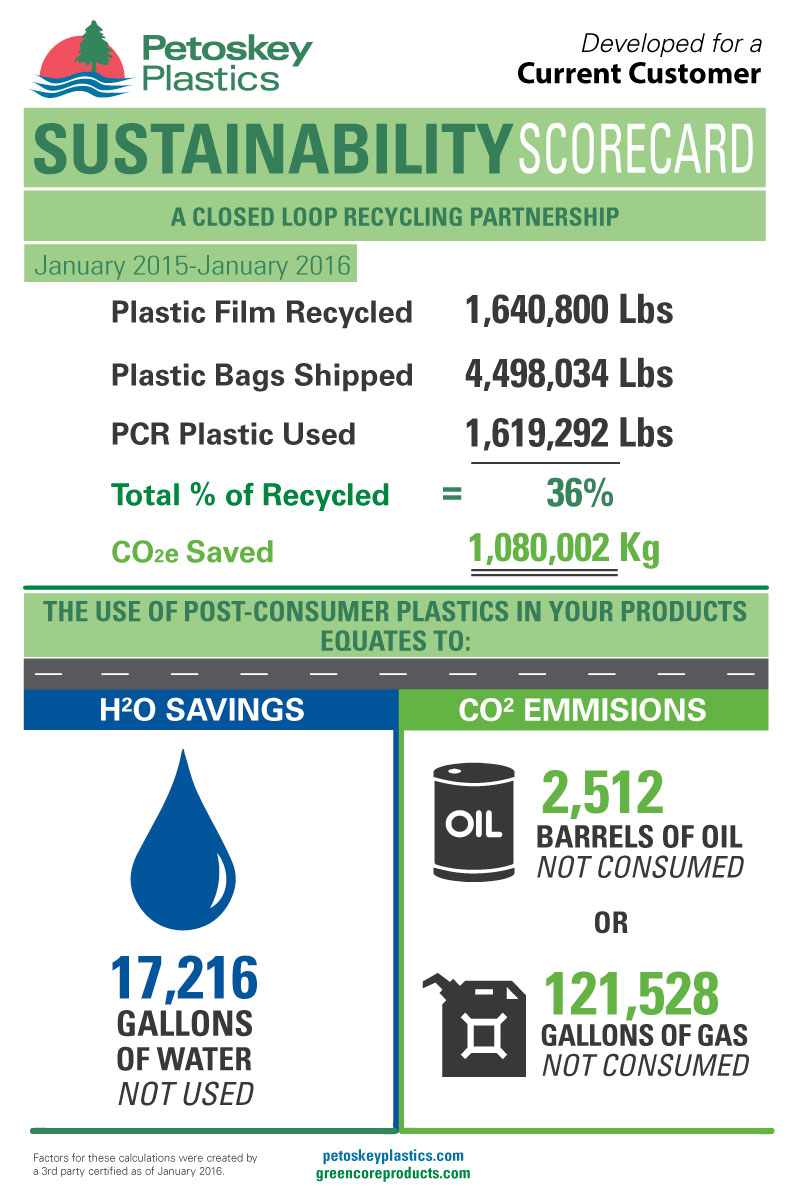
PETOSKEY — Many businesses engaged in recycling do so based on a philosophy of care for the environment, for social responsibility and for economics.
Some of these have found it challenging to gauge how much impact their recycling practices are actually having on the planet. But Petoskey-based plastics manufacturer and recycler Petoskey Plastics aims to change that with its recent introduction of a “Recycling Scorecard,” which is offered to customers that purchase products made with the company’s recycled blown plastic film.
Working with nationally recognized sustainability consultants, Petoskey Plastics has developed a system of calculating the impact its closed-loop recycling partners are having on the environment. The company is measuring and providing documentation, free of charge, to their customers on landfill diversion, carbon footprint equivalents, emission offsets, and water savings. The data are based on the level of recycled content supplied within film and bags purchased from the Petoskey company.
“The program is a first for the blown plastic film industry,” said Jason Keiswetter, Petoskey Plastics executive director of marketing, research and development.
“Sustainability scorecards are not new, but they are typically more focused on internal sustainability practices such as recycling or energy saving measures. This is the first robust, proactive effort we have seen that is specifically targeted at customers purchasing products with recycled content. Moreover, the reporting highlights their involvement in a closed loop recycling program.”
Petoskey is offering the program at no cost to its recycling partners in retail, distribution, shipping, automotive and other sectors.
The scorecard is based on a Life Cycle Analysis approach to measuring sustainable practices. Typically, such analyses measure energy use, raw materials consumption, air emissions, water effluents and solid wastes along the entire life cycle of a production system — from the initial extraction of natural resources to the final disposal of wastes. The Petoskey scorecard is unique in that it calculates pounds of carbon emissions saved in purchasing plastic film products with post-consumer recycled content.
In one scorecard example, a major retail chain saved close to 6 million kilograms of carbon dioxide entering the atmosphere in 2015 through its partnership in Petoskey’s closed-loop recycling program. The scorecard also includes information on what that figure represents in real terms. In this case, more than 91,000 gallons of water saved and the equivalent of over 13,000 barrels of oil, or more than 645,000 gallons of gas not consumed that contributed to the reduction in CO2 emissions.
“This new scorecard gives our customers and closed-loop partners the advantage of evaluating the actual impact of their purchasing and sustainability efforts, and communicating them in a way that investors, employees and their own customers can easily understand,” Keiswetter added. “Making a commitment to sustainable practices requires an investment, and this provides a quantitative evaluation of the return on that investment to the environment.”
As the plastics industry places greater importance on business and consumer recycling of plastics products, everyone can benefit from measuring results, according to Kim Holmes, director of recycling and diversion at SPI: The Plastics Industry Trade Association.
“With its pioneering efforts in closed-loop recycling and development of products containing PCR, Petoskey Plastics has long been a leader in the blown plastics film industry,” said Holmes. “This unique scorecard once again proves Petoskey’s leadership and can serve as a model for others in the industry.”
